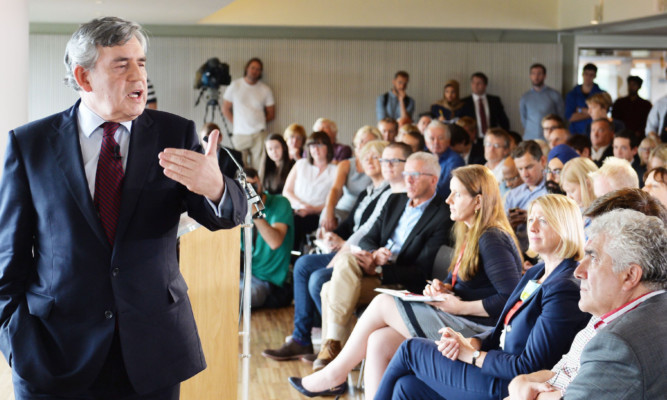There was a moment last week, as Jeremy Corbyn addressed packed halls across Scotland, when a radically left Labour Party didn’t seem such a bad idea after all.
The last time the party sent a UK leader north of the border, people were underwhelmed. In fact, during May’s general election campaign Ed Miliband was considered more unpopular here than David Cameron.
However, the mood shifted for Corbyn’s four-city tour. The left-wing firebrand was greeted by roaring masses and old men wiped away tears as the talk turned to reinstating Clause Four.
In Dundee, 500 people gathered to hear the current frontrunner in Labour’s leadership contest. The Glasgow event had to be moved to a bigger venue to accommodate the crowds.
If Corbyn, an unreconstructed doyen of the lunatic fringe of Labour, reshaped the party in his image, would all the socialists who deserted for the SNP return to the fold?
Scottish Labour, in despair over its near annihilation in May, would probably do almost anything to win back its supporters from the Nationalists.
Future boss?
Kezia Dugdale, now leader of the party in Scotland, went to Corbyn’s rally in Edinburgh, not because she agrees with him but because he could be her future boss.
“I can’t dismiss hundreds, if not thousands of people in different parts of the UK rallying around a person who represents an idea,” she said.
Would it really be so bad, going back to a nostalgic Labour world of nationalisation and resurgent trade unions, to closed shops and secondary pickets (there would be lots of strikes)?
That’s what some of us, alarmed by the unstoppable Nats, were beginning to think as Corbyn swept through our cities.
However, we have been brought to our senses, thanks to Gordon Brown.
In an impassioned speech in London on Sunday, he explained why a Labour Party led by Corbyn would be a disaster it would be completely unelectable.
And he reminded us, without having to spell it out, why the member for Islington North had not emerged as leadership material in the 30 or so years he has been a Labour MP.
It was “not an abandonment of principles to seek power” said the former Prime Minister, who was a founding father of the New Labour project that brought the party out of the wilderness and into government.
Although those other architects of New Labour Tony Blair, Peter Mandelson and Alistair Campbell have spoken out against Corbyn recently, it is Brown who will have the greatest impact on the party faithful.
Less tainted than Blair, he can still command the respect of the Labour movement and hopefully, as ballot papers for the leader’s election are sent out, his words of warning will be heeded.
Labour, said Brown, will be powerless to help the poor and vulnerable from the opposition benches. He could be accused of stating the obvious but the party has forgotten the lessons of the recent past.
Old Labour, under Michael Foot, then Neil Kinnock, helped the Tories to four successive election victories. It was only when the party ditched its left-wing agenda and reached beyond its heartlands that voters began to trust it again.
New Labour seems to embarrass the party now but it has been 50 years since Labour won a majority at a general election without Tony Blair. If it reverts to the pre-Blair policies of Jeremy Corbyn, we could be in for another half-century of Conservative rule.
Crowing Boris
No wonder Boris Johnson crowed in a newspaper column on Monday that the Tories couldn’t believe their luck.
“That fearsome New Labour machine,” he said, “is in the process of some kind of violent, unexpected and hilarious disintegration. It really looks as though it might be the end for the ruthless beast that won three election victories and struck terror for so long into Tory hearts.”
If Corbyn leads Labour, Johnson will probably get to be prime minister one day, after George Osborne has served two or three terms. But back to Brown, who tried to appeal to the disenchanted, to those hell-bent on following Corbyn into electoral oblivion.
The popularity of anti-establishment politics was a response to globalisation, he suggested.
However, solving global problems demands global cooperation and not the forming of alliances with Hezbollah and Hamas, and Vladimir Putin’s Russia (the latter much admired by one Alex Salmond).
Corbyn, a fan of all the above, has also cosied up to Sinn Fein, which you can do if you are on the margins but not in the mainstream, where the sensible centre must be courted. Protest movements may draw noisy support look at the SNP but, as Brown said, they cannot manage the economy or make the world safer.
Will the Labour Party listen to its former leader before it’s too late?
